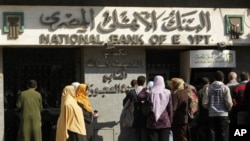The political turmoil in Egypt has hurt the local economy and affected the everyday life of its people, while it has generated a sharp increase in oil prices around the world.
Curfews, travel restrictions and communications blackouts have stymied many Egyptians, while some subsidized bread distributions points were closed.
Banks remained closed on Thursday and there were few working automatic teller machines with cash for withdrawals.
International tourists, a key revenue source for the country, canceled their excursions to Egypt during what normally would be the country's peak winter travel season.
Egypt is not a major oil producer, but the unrest has sparked fears that protests could spread to oil-exporting countries elsewhere in the volatile Middle East and disrupt oil production. There have also been concerns about possible disruptions to shipping through the Suez Canal, although only a small percentage of the world's oil exports pass through Egypt.
The price of North Sea Brent crude oil, the benchmark for two-thirds of the world, advanced in London trading Thursday to a 28-month high, topping more than $103 a barrel before retreating a bit.
As the protests against the 30-year rule of Egyptian President Hosni Mubarak continued for a 10th day, a financial services firm, Fitch Ratings, downgraded Egypt's credit rating by one notch to BB. Fitch is the third company to cut Egypt's credit standing this week.
It said the downgrade reflected the "significant intensification of unrest" in the country and what is likely to be a "volatile transition" to a new government. Mr. Mubarak says he will not seek re-election in the scheduled September voting, but anti-government protesters have demanded that he quit now.
The Paris-based Organization for Economic Cooperation and Development said the Egyptian government's five-day blockage of Internet services in the country likely cost the national economy at least $90 million. The agency said the shutdown could make it more difficult for Egypt to attract international companies in the future if they do not think the country's Internet service is reliable.
Some information for this report was provided by AP, AFP and Reuters.




